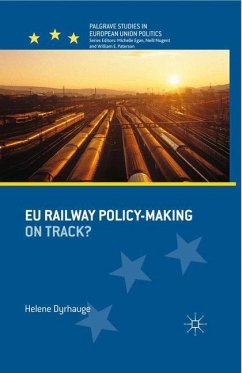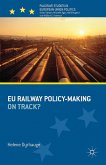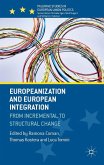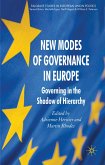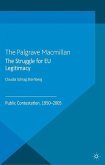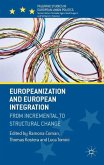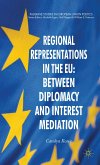Through policy and intervention national governments in Europe have long held an active interest in railways, an interest that has transferred to the supranational level via the EU commission. This book explores why the EU Commission has been so slow in creating an EU railway policy, pointing the finger at strong resistance by national governments
"Helene Dyrhauge provides a comprehensive overview of the development of railway policymaking in the EU. ... the book is significant in helping us better understand the rail sector and the challenges the EU has faced in making railways a more effective and competitive sector, which is inevitable for achieving a Single European Transport Area." (Erika Tarr, Journal of Common Market Studies, Vol. 53 (2), 2015)
'Both profound and clear. Embedded in an original theoretical framework, this book provides an excellent treatment of why EU Railway Policy, which represents a major factor in economic competitiveness and employment and by its very nature is fundamental to the achievement of freedom of movement across the EU, struggles to become a more effective sector.'
Michael Kaeding, University of Duisburg-Essen, Germany
This book examines the influence of Commission, Parliament, Member States and the rail industry on policy development over many years. Students of EU policy-making, integration theory and transport policy will all find valuable insights into the strengths and weaknesses of the different actors, as well as the explanatory capacity of both rational choice and historical institutionalism.
Handley Stevens, European Institute, London School of Economics and Political Science, UK
The author effectively combines historical and rational choice institutionalism to bring valuable theoretical insights to the analysis of the shape and direction of developments in EU railways policy, pointing to path dependence and incidences of critical juncture.
Paul Stephenson, Department of Politics, University of Maastircht, The Netherlands
'Both profound and clear. Embedded in an original theoretical framework, this book provides an excellent treatment of why EU Railway Policy, which represents a major factor in economic competitiveness and employment and by its very nature is fundamental to the achievement of freedom of movement across the EU, struggles to become a more effective sector.'
Michael Kaeding, University of Duisburg-Essen, Germany
This book examines the influence of Commission, Parliament, Member States and the rail industry on policy development over many years. Students of EU policy-making, integration theory and transport policy will all find valuable insights into the strengths and weaknesses of the different actors, as well as the explanatory capacity of both rational choice and historical institutionalism.
Handley Stevens, European Institute, London School of Economics and Political Science, UK
The author effectively combines historical and rational choice institutionalism to bring valuable theoretical insights to the analysis of the shape and direction of developments in EU railways policy, pointing to path dependence and incidences of critical juncture.
Paul Stephenson, Department of Politics, University of Maastircht, The Netherlands

